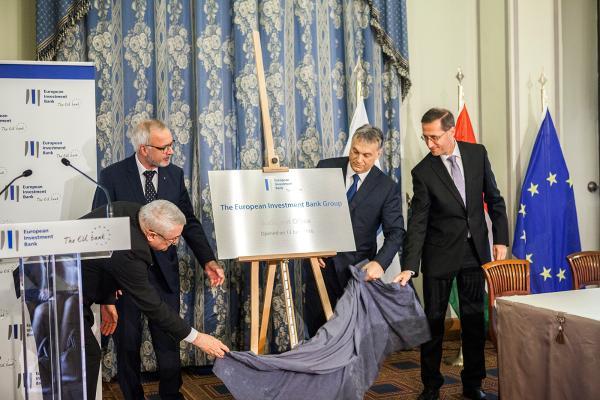
The European Investment Bank (EIB) Group inaugurated today its office in Budapest in a ceremony attended by the Prime Minister of Hungary, Viktor Orbán, the Minister of Finance, Mihály Varga, EU Commissioner Tibor Navracsics, and representatives of the Hungarian business community and public sector, thus establishing a local presence in Hungary, strengthening relations with promoters and partner banks, and widening its outreach in the country. The EIB Group Office is headed by Mr Alain Nadeau.
At the same time the EU bank has signed a loan of HUF 15.1 billion (some EUR 48 million) to finance the construction, expansion, modernisation and refurbishment of public education, pre-school and sports facilities in Hungary.
EIB President Werner Hoyer said: “The EIB Group Office in Budapest will support EIB Group activities in Hungary, where the EU bank already has a very fruitful record of cooperation, with a well-diversified lending commitment totalling EUR 19.3 billion since the start of the EIB’s activities in the country in 1990. The new representation will enable the EIB to be closer to its Hungarian counterparts and stakeholders, to increase even further our delivery capacity on the lending side and to strengthen our technical and financial advisory offer.”
The inauguration of the EIB Group Office for Hungary is in line with the EIB policy of increasing its presence in EU Member States. A physical presence in EU capitals will enable market proximity and closer institutional dialogue with the national authorities, thereby helping to enhance project identification and the appraisal of new operations.
The EIB currently has offices in 20 EU Member States and 19 countries outside the EU promoting business and policy dialogue.
EIB Vice-President László Baranyay commented after signing the loan agreement: “EIB financing will help improve Hungary’s education infrastructure and provide for better education services, increased inclusion and improved integration of the population, so contributing to the intellectual and social development of the country. Moreover, the community use of the new school sport facilities will promote the project´s social sustainability, particularly in poorer regions where such amenities are often lacking.”
EIB funds will support the implementation of five different central government programmes in 2015-2018 involving the construction of classrooms and gymnasiums, development of school swimming pools, construction, improvement or renovation of other sports facilities with mixed school and community use and investment in pre-school facilities.

Photographer: EIB ©To be defined
Download original

Photographer: EIB ©To be defined
Download original

Photographer: EIB ©To be defined
Download original

Photographer: EIB ©To be defined
Download original

Photographer: EIB ©To be defined
Download original

Photographer: EIB ©To be defined
Download original